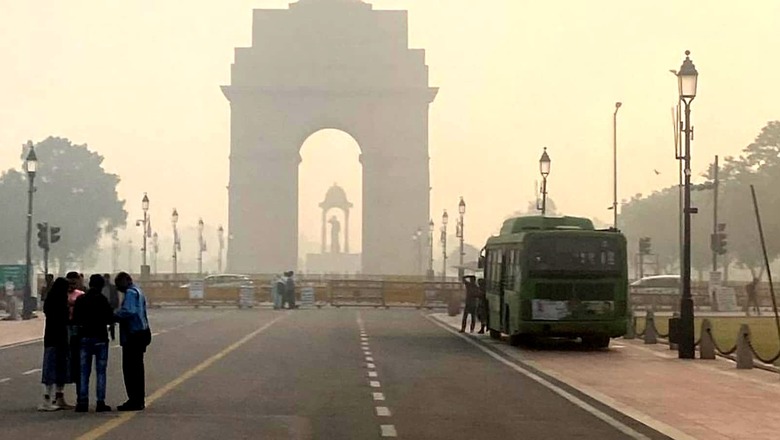
views
Delhi’s hazardous air pollution levels have created a Catch-22 situation for the ruling AAP. With toxic smoke from farm fires blanketing the capital, will it give priority to the health and well-being of the citizens of Delhi, or appease the farmers of Punjab?
Farm fires raging in the green revolution states of Punjab and Haryana have turned Delhi’s air quality ‘severe’. Having come to power in Punjab in the wake of the farmers’ agitation of 2020-21, the AAP will be wary of cracking down on those who are setting fires to clear their fields of stubble before the winter sowing.
But what about Delhi, where patients with respiratory ailments and inflammation of the eyes are thronging hospitals? Studies say that in 2020 alone, air pollution caused 54,000 premature deaths. Asthma, COPD (chronic obstructive pulmonary disease), hypertension, cardiovascular disease and bladder cancer are some of the long-term effects of exposure to bad air, according to health professionals.
Multiple studies have found that a high proportion of children in Delhi have impaired lungs as a result of air pollution. Given that health and education have been the AAP’s flagship schemes, one would imagine that clean air would be a priority.
The AAP’s credibility in terms of tackling this ‘burning’ issue is doubtful. It had accused the Punjab government, then helmed by the Congress, of choking Delhi by failing to prevent farm fires. But during the farmers’ agitation, it supported all the demands made by the protestors, which included decriminalising stubble-burning. The Centre, too, caved in to this demand. A year ago, the then CM of Punjab, Charanjit Singh Channi, quashed all the stubble-burning cases against farmers.
Now that AAP is in power, the shoe is on the other foot. It has failed to curb farm fires despite a statewide awareness campaign and repeated appeals to farmers. Punjab chief minister Bhagwant Singh Mann’s claim that he had taken strong initiatives to curb the practice has proved hollow.
The number of farm fires until 31 October was 16,004, as compared to 13,124 last year. According to news reports, Punjab recorded 2,131 farm fires on 31 October alone. The BJP and Congress, both in the Opposition in Punjab, have accused AAP supremo and Delhi CM Arvind Kejriwal of fiddling while Punjab burns.
The farmers are demanding monetary compensation in return for not putting a match to their fields, and are undeterred by fines and red-listing (which disallows the farmer from taking loans or mortgaging their fields). Farmers’ unions have already started protesting against such ‘red entries’ in revenue records. The ever-present threat of another farmers’ stir implies that no politician will advocate a tough approach.
To be fair, Mann is hamstrung by his state’s flailing economy and the AAP’s political compulsions. The solutions are many and varied, but require an extraordinary political will, because the politics of subsidies is at the heart of the problem.
Punjab’s farmers are dependent on groundwater, because rice is a water-guzzling crop. This in turn means that they are dependent on subsidized power to run their tubewells. The state’s long-standing power subsidy — a major burden on its finances — has become a sensitive political issue, and any attempts to rationalise it have been stymied by the influential farm lobby.
Crop diversification would be an ideal solution, but the power subsidy incentivizes farmers to grow rice. However, they are unable to manage the paddy straw, which is unsuitable for fodder and therefore of no value to them. The post-harvest stubble left by combine harvesters must be cleared expeditiously, before the rabi sowing (any delay decreases the yield). Farmers do it by burning, because the cost of a matchbox is much lower than that of labour or machinery.
Successive state governments have sought to provide farmers with subsidised machinery and microbial cultures to remove or decompose straw, but neither has caught on. Paddy straw does have industrial applications, but few farmers have the wherewithal to invest in balers which can package the straw for sale.
Meeting the farmers’ demand for compensation is difficult, given Punjab’s debt burden of Rs 2.58 lakh crore (the highest debt to GSDP ratio in the country). Debt-servicing accounted for Rs 36,512 crore in 2021-22. As economist RS Ghuman pointed out recently, “The Punjab Government is in a debt trap as the debt is being serviced by taking additional loans.”
In any case, paying farmers is not a long-term solution. They must be incentivised to shift to less water-and-labour intensive crops, and disincentivised from growing rice. At the same time, the state must implement a viable straw management system. Although the health of the NCR’s children is at stake, no political party has shown the courage to tackle the issue head-on.
Bhavdeep Kang is a freelance writer and author of ‘Gurus: Stories of India’s Leading Babas’ and ‘Just Transferred: The Untold Story of Ashok Khemka’. A journalist since 1986, she has written extensively on national politics. The views expressed in this article are those of the author and do not represent the stand of this publication.
Read all the Latest Opinions here

















Comments
0 comment